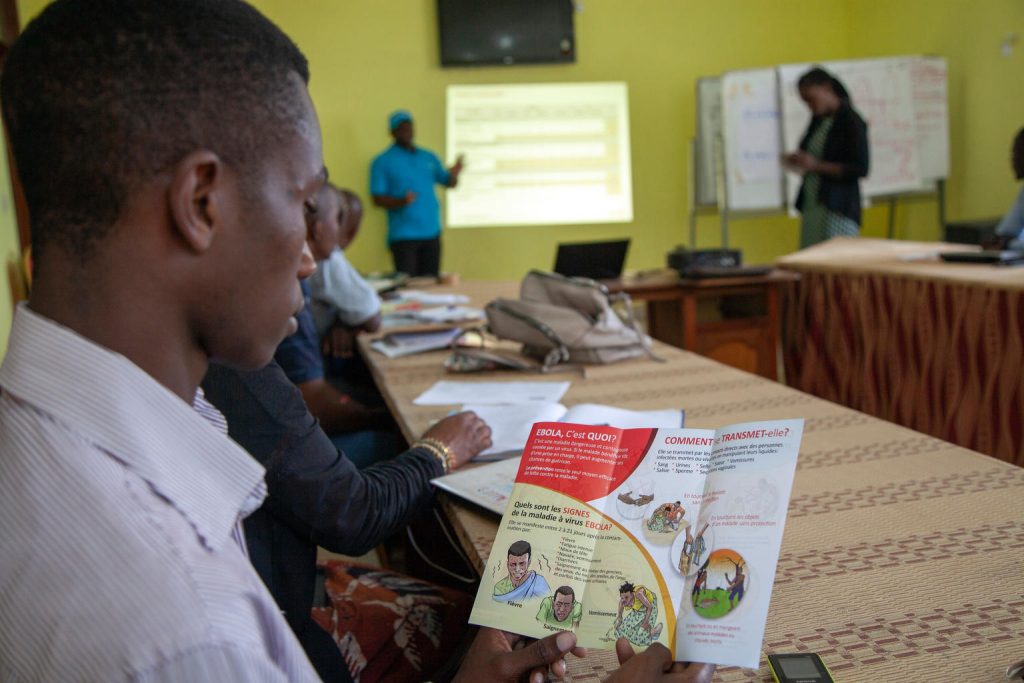This note provides an overview of a selection of key messages related to the Ebola outbreak and response that were circulating on WhatsApp and in the local media in the Grand Nord (Beni and Lubero territories), DRC, in November and December 2018. The note was prepared by Rachel Sweet (Harvard University) with support from Juliet Bedford (Anthrologica). Rachel Sweet is a leading expert on North Kivu and is collaborating with the Social Science in Humanitarian Action Platform to support the response.
Briefings
Media and Local Messages on Ebola in the Grand Nord, DRC

UNICEF/Naftalin
On 9 August 2018, a humanitarian partner reads an Ebola prevention pamphlet during a UNICEF training in prevention messaging in Ebola-hit North Kivu, DRC. As at 8 August 2018, UNICEF briefed 60 community leaders in Mabalako health zone and 581 community members in Beni health zone on Ebola prevention messages as well as distributed 200 posters and 300 Ebola prevention pamphlets. Mass communication on Ebola prevention messages is being integrated into activities of local churches and local radio stations with 241 churches having received Ebola prevention messages and 79 local journalists being briefed.
Following the 1 August 2018 announcement by the Government of the Democratic Republic of the Congo (DRC) of a new Ebola Virus Disease (EVD) outbreak in North Kivu, UNICEF has mobilized its teams to help contain the spread of the disease and protect children. The impact of an outbreak on children can be far reaching. It’s known from earlier outbreaks in the DRC as well as in West Africa that children can be affected in various ways. Children can themselves be infected by the disease, but the impact goes beyond; it impacts their families and communities as children can lose their parents, care-givers and teachers. Access to basic services such as health care and education can become severely compromised. Also, children who are infected or whose relatives are, face stigmatization and social exclusion.
The Congolese Government has activated its response plan and called its partners, including UNICEF, to participate in the response. UNICEF has deployed a team to Beni for the response, including health specialists, communication specialists and a water, sanitation and hygiene specialist from the Ebola-response team in the Province of Equateur. Health, water, sanitation and hygiene and communication supplies have been sent to the affected areas including 300 laser thermometers to monitor the health conditions of people in the affected region and 2,000 kg of chlorine
Related content
Infographics
Key Considerations: Alleviating Chronic Food Insecurity in South Sudan
This infographic summarises key considerations from a SSHAP brief on responding to food insecurity in South Sudan authored by Tong Anei and Leben Moro. The infographic highlights the importance of investing in agriculture and livelihoods, enhancing market access and infrastructure, and…
Central and East Africa Hub
SSHAP
2024
Briefing
Key Considerations: Risk Communication and Community Engagement for Mpox Vaccination in Eastern DRC
This brief presents social and political considerations for the design and implementation of vaccination-related risk communication and community engagement (RCCE) strategies for mpox in the eastern Democratic Republic of the Congo (DRC). A nationwide outbreak of mpox (clade I) was…
Central and East Africa Hub
SSHAP
2024
Briefing
SSHAP West Africa Hub: Health Emergency Cycles and Social Context in West Africa
The SSHAP West Africa Hub brings together academics, humanitarian responders and public health practitioners primarily working in Nigeria, Senegal and Sierra Leone to explore socio-political and historical issues shaping crises, with the intention of enhancing national and humanitarian programmes seeking…
West Africa Hub
SSHAP
2024
Report
Roundtable Report: Discussion on mpox in DRC and Social Science Considerations for Operational Response
On 28 May 2024, the Social Science in Humanitarian Action Platform (SSHAP) organised a roundtable discussion on the mpox (formerly known as monkeypox) outbreak which has been spreading in the Democratic Republic of the Congo (DRC) since early 2023.1 The…
Central and East Africa Hub
SSHAP
2024


